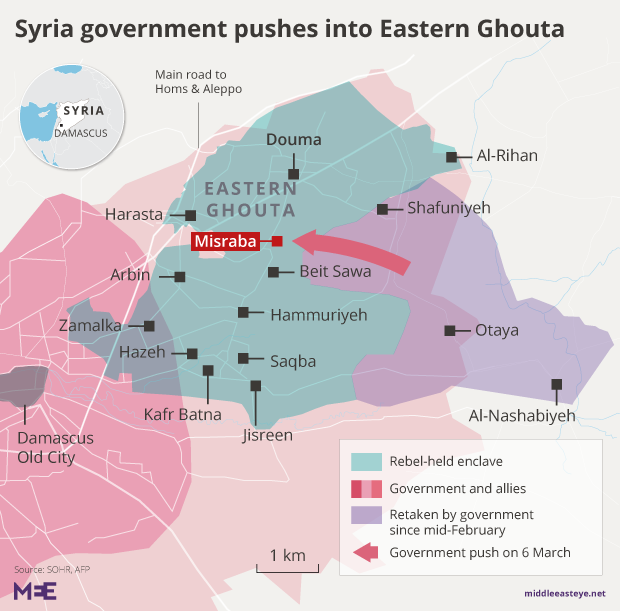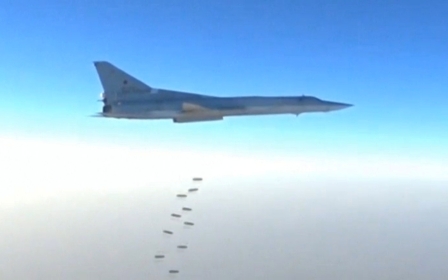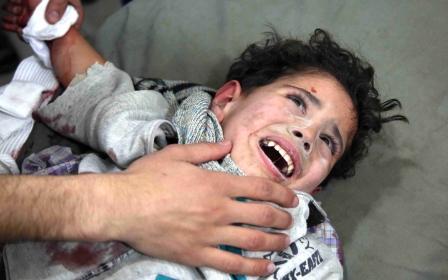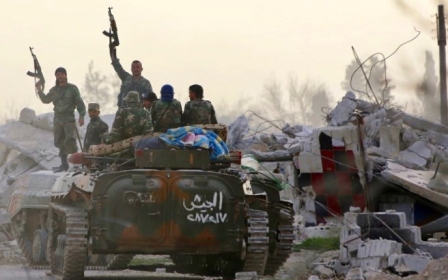Syrian colonel says Ghouta will re-enter 'embrace' of state as troops move in
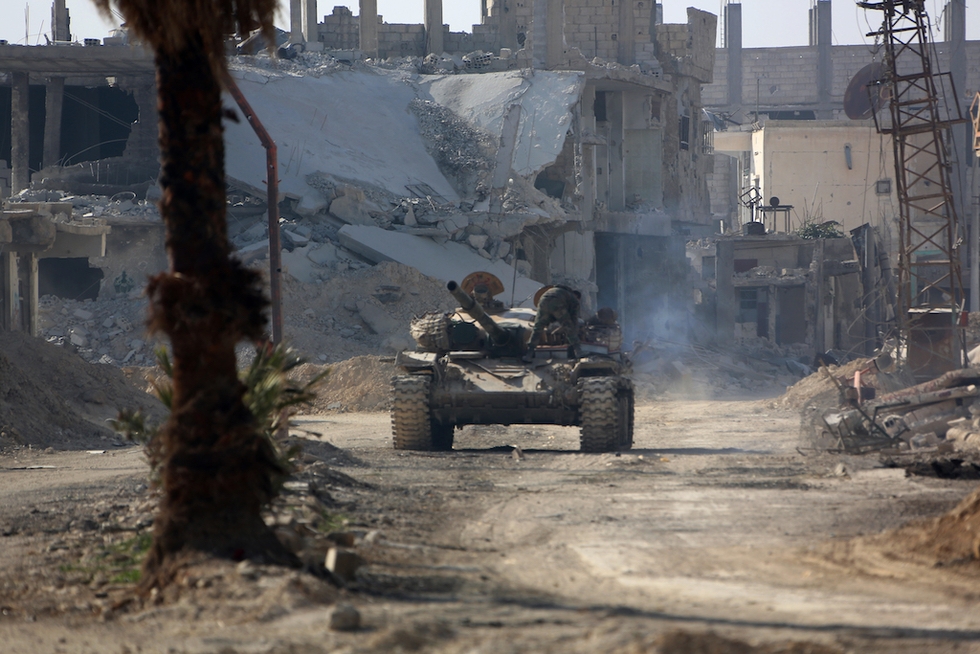
A Syrian army colonel has said the besieged Eastern Ghouta region will soon re-enter the "state's embrace", as troops launched an offensive that now has cut the rebel-held enclave in two.
Government troops have advanced rapidly across farmland in Eastern Ghouta in the past week and have wrested control of more than 50 percent of the territory.
The Syrian Observatory on Human Rights said that hundreds more pro-government fighters had been deployed to front lines, tightening the noose around the shrinking rebel enclave.
"At least 700 Afghan, Palestinian, and Syrian loyalist militiamen came from Aleppo and were sent late Tuesday to Ghouta," said Rami Abdel Rahman, head of SOHR.
The Britain-based monitor said the reinforcements were deployed to two main battlefronts on the western side of the enclave, including the town of Harasta.
Fresh air strikes on the region brought the death toll for Wednesday's bombardment on the rebel-held enclave near Damascus to 45, added SOHR.
The organisation said at least 18 of the day's victims were killed in strikes carried out by Russian warplanes.
The United Nations says 400,000 people are trapped in the towns and villages of the eastern Ghouta, under government siege for years and already running out of food and medicine before the assault. An aid convoy reached the area this week but government officials had stripped out most medical supplies.
The campaign has so far left at least 867 civilians dead, including dozens of children, according to the Syrian Observatory for Human Rights.
The Syrian army and allied militia launched an offensive on 18 February to retake Eastern Ghouta, the last rebel-controlled region near the capital Damascus, and army spokespeople have warned that rebel control of the area will soon end.
"We have received instructions from the army command to lift the siege off our people in eastern Ghouta," the colonel said in a broadcast near the town of Mesraba.
"God willing, very, very, very soon...they will return to the state's embrace."
By Wednesday, government troops were at the edges of several key towns, including Misraba, Beit Sawa, Jisreen and Hammuriyeh.
Pro-government forces appeared to be approaching the central towns of Misraba and Mudayrah from the east, potentially splitting the enclave in two.
Live footage broadcast by Syrian state TV from the outskirts of Misraba showed enormous clouds of smoke rising into the sky. The sounds of explosions and jets could be heard.
A state TV correspondent said militant defences in the town were being struck by "preparatory fire" in advance of a planned infantry assault.
The fighting has followed weeks of air strikes by Russian and Syrian jets which have left hundreds dead.
Although 46 aid trucks entered the area on Monday for the first time since the offensive started, they had cut short their deliveries due to heavy bombardment.
Nearly half of the food carried on the convoy could not be delivered and Syrian authorities removed some medical and health supplies from the trucks, the United Nations said.
Next 'apocalypse'
Zeid Raaad al-Hussein, head of the United Nations Human Rights Council, warned in his annual report the destruction in Ghouta would simply be repeated elsewhere without any attempts to end the conflict.
"This month, it is Eastern Ghouta which is, in the words of the secretary-general, hell on earth," he said.
"Next month or the month after, it will be somewhere else where people face an apocalypse - an apocalypse intended, planned and executed by individuals within the government, apparently with the full backing of some of their foreign supporters."
Defeat in Eastern Ghouta would mark the biggest setback for the anti-Assad rebellion since the opposition was driven from eastern Aleppo in late 2016 after a similar campaign of siege, bombing, ground assaults and the promise of safe passage out.
Moscow and Damascus say the Ghouta campaign is necessary to halt rebel shelling of the capital. The SOHR says such shelling has killed at least 27 people since 18 February, and Syrian state media have given a higher death toll.
More than 340,000 people have been killed and millions displaced in Syria since the start of the civil war in 2011 with the brutal repression of anti-government protests.
Over the years, numerous rounds of UN-backed Syria peace talks have failed to stem the fighting.
In the latest attempt to end the seven-year war, the foreign ministers of government allies Iran and Russia and rebel backer Turkey are to meet next week in Astana.
New MEE newsletter: Jerusalem Dispatch
Sign up to get the latest insights and analysis on Israel-Palestine, alongside Turkey Unpacked and other MEE newsletters
Middle East Eye delivers independent and unrivalled coverage and analysis of the Middle East, North Africa and beyond. To learn more about republishing this content and the associated fees, please fill out this form. More about MEE can be found here.


